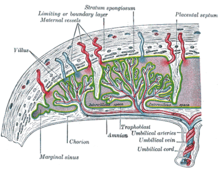
The placental microbiome is the nonpathogenic, commensal bacteria claimed to be present in a healthy human placenta and is distinct from bacteria that cause infection and preterm birth in chorioamnionitis.[1] Until recently, the healthy placenta was considered to be a sterile organ but now genera and species have been identified that reside in the basal layer.[2][1]
It should be stressed that the evidence for a placental microbiome is controversial.[3][4] Most studies supporting the existence of a placental microbiome lack the appropriate experimental controls, and it has been found that contamination is most likely responsible for reports of a placental microbiome.[3][5]
The placental microbiome more closely resembles that of the oral microbiome than either the vaginal or rectal microbiome.[1]
- ^ a b c Fox C, Eichelberger K (2015). "Maternal microbiome and pregnancy outcomes". Fertility and Sterility. 104 (6): 1358–63. doi:10.1016/j.fertnstert.2015.09.037. PMID 26493119.
- ^ Schwiertz, Andreas; Rusch, Volker (2016). "A Short Definition of Terms". In Schwiertz, Andreas (ed.). Microbiota of the Human Body. Advances in Experimental Medicine and Biology. pp. 1–3. ISBN 978-3-319-31248-4.
- ^ a b Perez-Muñoz, Maria Elisa; Arrieta, Marie-Claire; Ramer-Tait, Amanda E.; Walter, Jens (2017-04-28). "A critical assessment of the "sterile womb" and "in utero colonization" hypotheses: implications for research on the pioneer infant microbiome". Microbiome. 5 (1): 48. doi:10.1186/s40168-017-0268-4. ISSN 2049-2618. PMC 5410102. PMID 28454555.
- ^ Kliman, Harvey J. (2014-09-17). "Comment on "The placenta harbors a unique microbiome"". Science Translational Medicine. 6 (254): 254le4. doi:10.1126/scitranslmed.3009864. ISSN 1946-6234. PMID 25232175. S2CID 206685421.
- ^ Lauder, Abigail P.; Roche, Aoife M.; Sherrill-Mix, Scott; Bailey, Aubrey; Laughlin, Alice L.; Bittinger, Kyle; Leite, Rita; Elovitz, Michal A.; Parry, Samuel (2016-06-23). "Comparison of placenta samples with contamination controls does not provide evidence for a distinct placenta microbiota". Microbiome. 4 (1): 29. doi:10.1186/s40168-016-0172-3. ISSN 2049-2618. PMC 4917942. PMID 27338728.